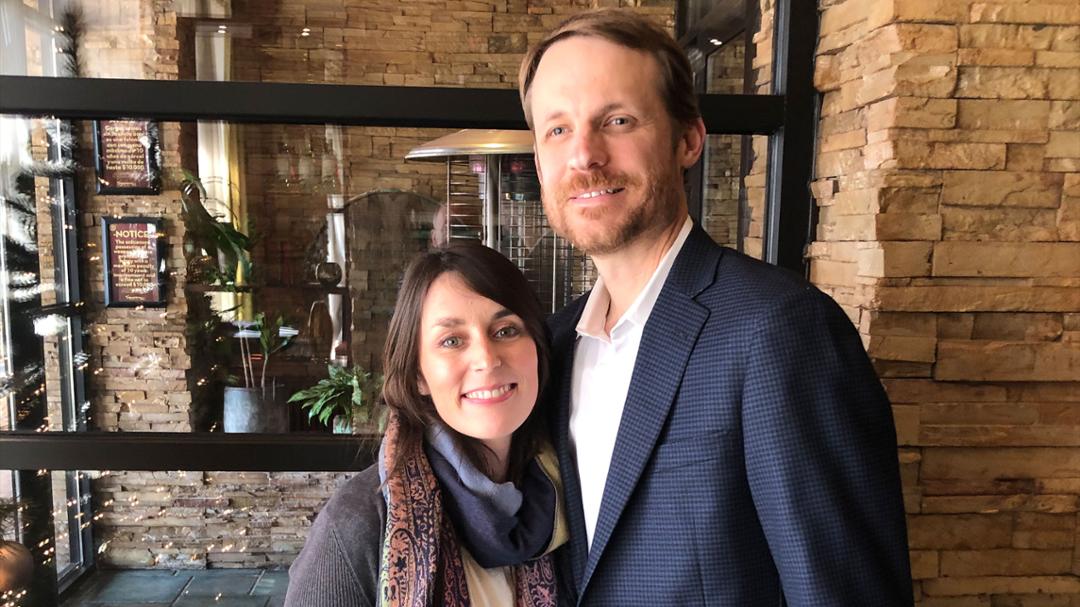This Texas Tech graduate went through a harrowing experience with bacterial meningitis two decades ago and has come out stronger on the other side.
It is impossible to know exactly what was going on inside the mind and body of John B. Grimes during that awful eight-day stretch when he hovered in the liminal space between life and death. Microscopic armies were battling for control, and all he could do at the time was what he was doing.
John was lying there in a coma, hooked up to humming and whirring machines rhythmically keeping tabs on him as he fought for his life. He was surrounded by medical professionals, praying parents and faithful friends who were still trying to piece together the mystery leading to his sudden hospitalization and increasingly precarious condition in the intensive care unit at what is now known as UMC Health.
As is almost always the case, more is known now than was known on the Day Everything Changed, but one thing remains certain about the series of unfortunate events that took place early in the second semester of his sophomore year at Texas Tech University more than two decades ago.
He has been forever changed by the experience.
Bacterial meningitis was the menacing and stealthy foe that stalked him from out of nowhere with lethal intent. It didn’t take his life, but the disease left its mark, stealing virtually all his vision and inflicting permanent neurological damage.
And, as you might expect, he has never seen life the same way since, literally and figuratively. Some might suggest he was unbelievably unlucky, but John would be the first to tell you how lucky he feels because as bad as it was, it could have been much, much worse.
“There were lots of times where I probably shouldn’t have made it,” John says with the retrospective wonder of someone who has cheated death and lived to tell about it. “But I did. There were a lot of miraculous twists and turns that happened in the meantime, and it was a life-changing thing.”
In all, John spent three weeks at UMC, first coming back from the precipice of death and then rebounding from the internal havoc the meningitis caused. He still doesn’t know exactly what happened or how it happened, and he has given up on trying to figure out why it happened to him.
But to explain the how and why requires a little time travel and a lot of patience because some puzzle pieces are still missing.
A terrible day 26 years ago
It was early in the spring semester of 1998. John was a 19-year-old student in what is now the Jerry S. Rawls College of Business. He grew up in Ohio, but in 1992 his family moved to the burgeoning North Dallas suburb of Plano, where he finished high school.
Before that, he thought he might attend Ohio State University, but he learned about and became intrigued by the business program at Texas Tech and decided he would pursue his education on the South Plains.
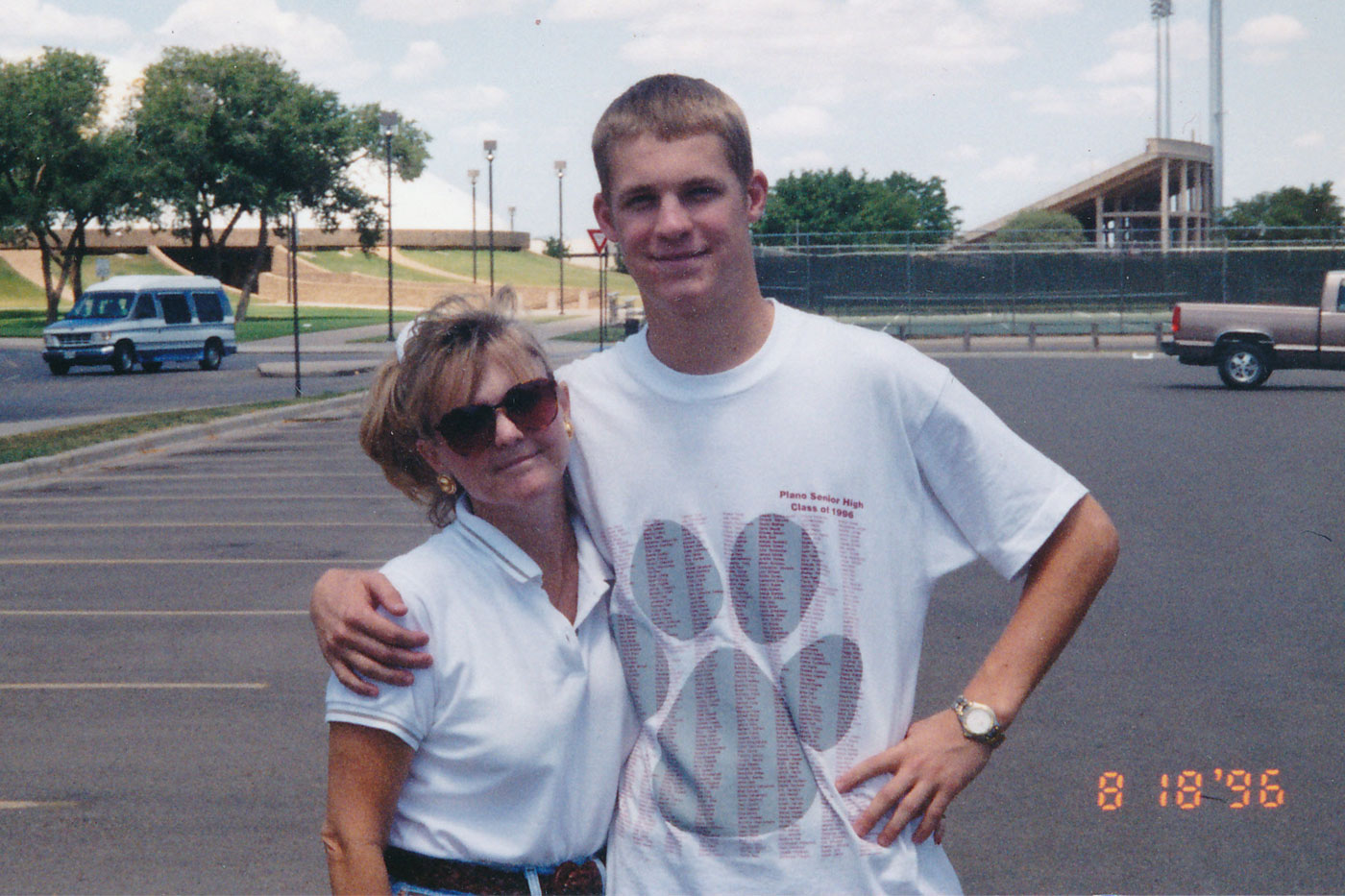
“When I visited Lubbock, it just felt right,” he said, echoing a sentiment expressed by many through the years.
“One of the things I will always remember about Lubbock is how blue the sky seemed to be,” he said. “I don’t know if you’ve ever noticed that, and of course, you’re not visually impaired, so take it for what it’s worth. It just seemed like 90% of the time I could look up and the sky was this incredible blue color.”
His first three semesters rolled along without any significant bumps. On the February day that sliced his life in two, he was studying for an upcoming test and preparing for a party with his Delta Tau Delta fraternity brothers.
What happened next is still difficult for John and his family to describe, although he has lots of fond memories from his time at Texas Tech.
On the Day Everything Changed, John started feeling terrible early on a Friday. He wasn’t sure what was going on. He thought it could be a nasty cold or maybe the flu. Both would have been circulating during that time of year.
He called his parents and let them know he was running a fever and going to bed. He advised his two roommates to leave their apartment across from campus and stay elsewhere to avoid contracting whatever possible contagion he might have had.
“We talked to him and told him if it got any worse to have one of his roommates take him to the medical office there at the university,” remembered his father, Doug Grimes. “And that’s how we left it.”
The next day, his parents didn’t receive a phone call from their son updating them on his condition, so they called him. But there was no answer, although a college kid not being home on what would turn out to be a 70-degree mid-winter Saturday was no reason for alarm.
Satisfied nothing was amiss, Doug and his wife, Betsy, began their own typical Saturday activities, buying groceries and running errands together. The day was so gorgeous they took their time driving around and enjoying it.
But nothing was as it should have been. John was feeling progressively worse, and it was only by chance that one of his fraternity brothers would even find him that day. John had fallen out of bed during a sleepless night. Because of the direction he fell, he was not visible to anyone who might take a quick peek in the room to check on him.
“It was midmorning, and his fraternity big brother, Brad, stopped by to check on him,” Betsy said. “He saw John’s car and stopped. He knocked on the door, but no one answered.
In the first of a string of fortuitous occurrences the Grimes family can only describe as miracles, the door was unlocked and Brad went in.
“If the door was locked, that’s probably where this story ends,” John says.
Brad called out once inside the two-bedroom apartment but got no response and figured John had left in someone else’s car. Brad went into John’s room and noticed a box of tempting treats from Cheryl’s Cookies that John’s aunt regularly sent his way from her home in Ohio.
“Brad saw that latest delivery of cookies and decided to get a couple because John always shared them with his friends,” Betsy said. “In the length of time it took Brad to get a cookie, he heard John, who was on the other side of the bed. If it hadn’t been for that, he might have decided John just wasn’t there and gone on about his business. That’s how John was discovered.”
John was in shockingly poor shape. He had spent the night violently ill, vomiting repeatedly, emptying the contents of his stomach. He had either tried to get up and fallen or just tossed and turned beneath his covers until he tumbled from the bed. Then he thrashed about on the bedroom carpet, and the fibers abraded his face. That, coupled with powerful acne medication he was taking at the time, gave him a ghastly appearance.
Brad wasted no time swinging into action. He called an ambulance that transported John to the emergency room at UMC, where they were unsure what had happened or how to treat him.
“Of course, the first thing they think in a college town is, ‘What drug has he taken?’” Betsy said. “Eventually, they told us they got him there with minutes to spare.”
“I would hate to guess at just how long John had laid there by himself before his friend showed up,” Doug added.
For the first of what would be several times, John had come close to dying.
Coming back from the brink
There are two most prevalent types of meningitis – bacterial and viral – and the course of treatment varies depending on which is contracted. Once meningitis is diagnosed, treatment has to begin immediately. In John’s case, the doctors rapidly deduced what it was and that they had precious little time to respond.
“They have to assess it quickly,” Betsy said. “With bacterial, they have to do a spinal tap, which takes time, and the doctors knew he didn’t have much time. For some reason, the ER doctor knew it was bacterial and began treating it.”
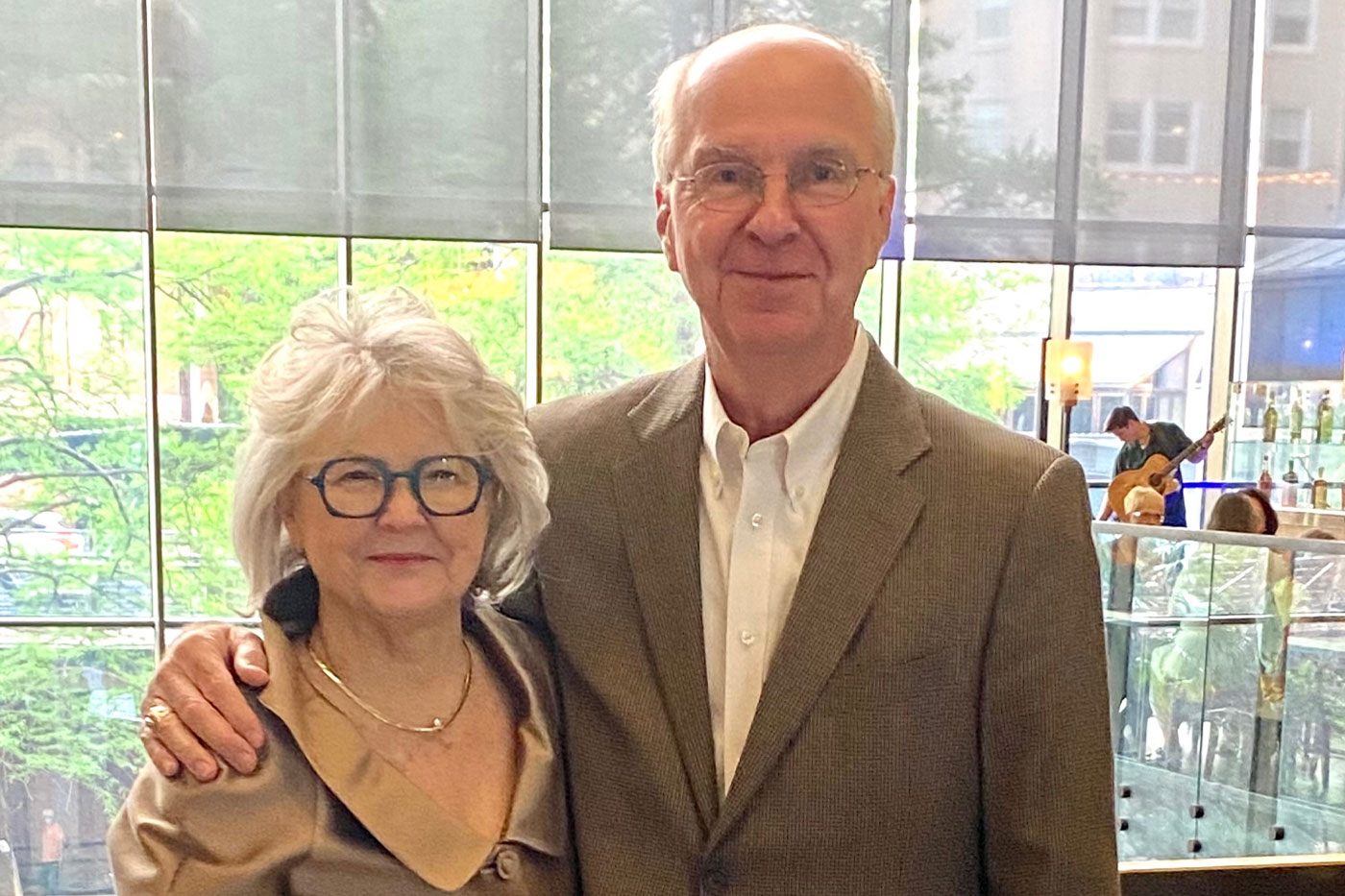
John’s parents would learn all of this after they arrived in Lubbock. In the absence of widespread cellphone use, the Grimes’ younger son had gotten a call from a neighbor that one of John’s roommates was trying to reach them. John was apparently near death as his parents were wrapping up their Saturday errands and making their way home.
“We were at a stoplight about a mile from our house,” Doug said. “Two cars collided in the middle of the intersection and came flying toward us, and our car got hit, and all I could think was, ‘What the heck?’”
The police and several ambulances arrived on the scene to sort things out. Doug and Betsy were sitting in front of their car waiting to be cleared so they could get home. About that time, an officer approached the couple and asked for their names.
“I said, ‘I am Doug, and this is my wife, Betsy Grimes,’” he said. “The officer looks at me for a second and says, ‘What did you say?’ I repeated it so he asks for our address in Plano, and I give him that.”
The officer told the Grimeses authorities had been searching for the couple the past four hours. Doug and Betsy asked why that would be, and with dramatic understatement, were told their son in Lubbock was apparently not feeling well. Their car was out of commission, so the police provided them with a ride home where they breathlessly called UMC for an update.
“Get here as fast as you can,” they were told.
Doug and Betsy booked the first Southwest Airlines flight they could and departed Love Field bound for Lubbock, stomachs queasy with anxiety and minds filled with a lot more questions than answers. A one-hour flight, it seemed to take forever.
It was closing in on midnight when they were met at the airport by one of John’s roommates, who drove them to UMC. About a dozen of John’s friends had set up a vigil, and they wasted little time providing his parents with emotional support as well as physical comfort in the form of blankets and pillows so they could sleep on the floor just outside the door of the ICU. That was as close as they were allowed.
Before the pallets were spread out, the medical team wanted to prepare John’s parents for what they were going to see. They were escorted to a nearby conference room and told to brace themselves for the likelihood their son would not live through the night.
“First, they wanted to make sure we knew what he would look like as far as the shape he was in,” Betsy said. “Then they wanted to know if we would be willing to donate his organs.”
Meningitis always plays for keeps
Whether it is viral or bacterial, meningitis is a frightening and formidable disease. Treatments, including vaccines, have progressed considerably since the late 1990s, but meningitis remains highly contagious and can quickly spread with deadly consequences. The bacterial variety is airborne, and it often waits for a perfect storm of conditions to strike. Many times this takes place when large groups of people share relatively restricted common living spaces such as military barracks or college residence halls.
Meningitis is an infection of the membranes that surround and protect the brain and spinal cord. At least a half-dozen types of bacteria can cause meningitis, and it can cause death in as little as several hours; it is treated with potent antibiotics. Vaccines have been developed in recent years and are among recommended immunizations for children when they reach specific ages.
John didn’t even live on campus at the time, and he didn’t recall being in a crowded space for any significant length of time. Ultimately, the medical team chalked up his meningitis exposure to the unsatisfying theory of being in the wrong place at the wrong time.
No one else contracted the disease from John as no other cases were reported. Authorities conducted contact tracing such as it was in the late 1990s, following John’s trail of the previous day that included stops at a nightspot adjacent to campus and an intramural basketball game.
But during these moments in the ICU, John clinging to life and his parents clinging to hope, the ins and outs comprising a tapestry of detail didn’t really matter.
“We were hesitant in seeing him because we didn’t know what had happened to him,” Betsy said. “The acne medication he was on is very potent as it basically shreds a layer of your skin. After he fell out of bed, he went into convulsions. He rubbed against the carpet, and that caused burns all over his face. The doctors had no idea what was going on, and they didn’t want to touch his skin because it looked so sore.”
It would be several days before John’s parents figured out what had happened.
Recalling that first visit to John’s room, even more than 25 years later, Betsy still weeps at the memory of seeing her son’s devastated body. A ventilator was helping him breathe. Her immediate prayer was for angels to come and lift his chest to ensure his lungs kept working.
“Early that next morning, they told us they thought it was meningitis, and they said that it was going to leave him with some health issues,” Doug said. “They said he could be blind. He could lose a limb. They just didn’t know. They didn’t paint a very good picture, but that’s because they didn’t have all the answers yet. They expected to know a lot more over the next two or three days.”
People rallied around the Grimes family during those first challenging days. There were connections between Doug and Betsy’s Sunday school class in Plano and people in Lubbock. John’s friends continued to show up. Food arrived, and accommodations were provided.
Compassion sometimes came from the most unexpected places. Doug remembers leaving John’s bedside to walk around the hospital to think and pray. It was about this time he noticed a man intently looking at him. For whatever reason, Doug knew the man had something to say to him.
“I knew there would be some conversation, but there wasn’t,” he said. “It was just he and I looking at each other, and I felt warm for some reason. I know that sounds crazy. Then he said, ‘Everything is going to be fine.’ And then he kept walking. I turned around to look at something and then looked back and I didn’t see him anymore.”
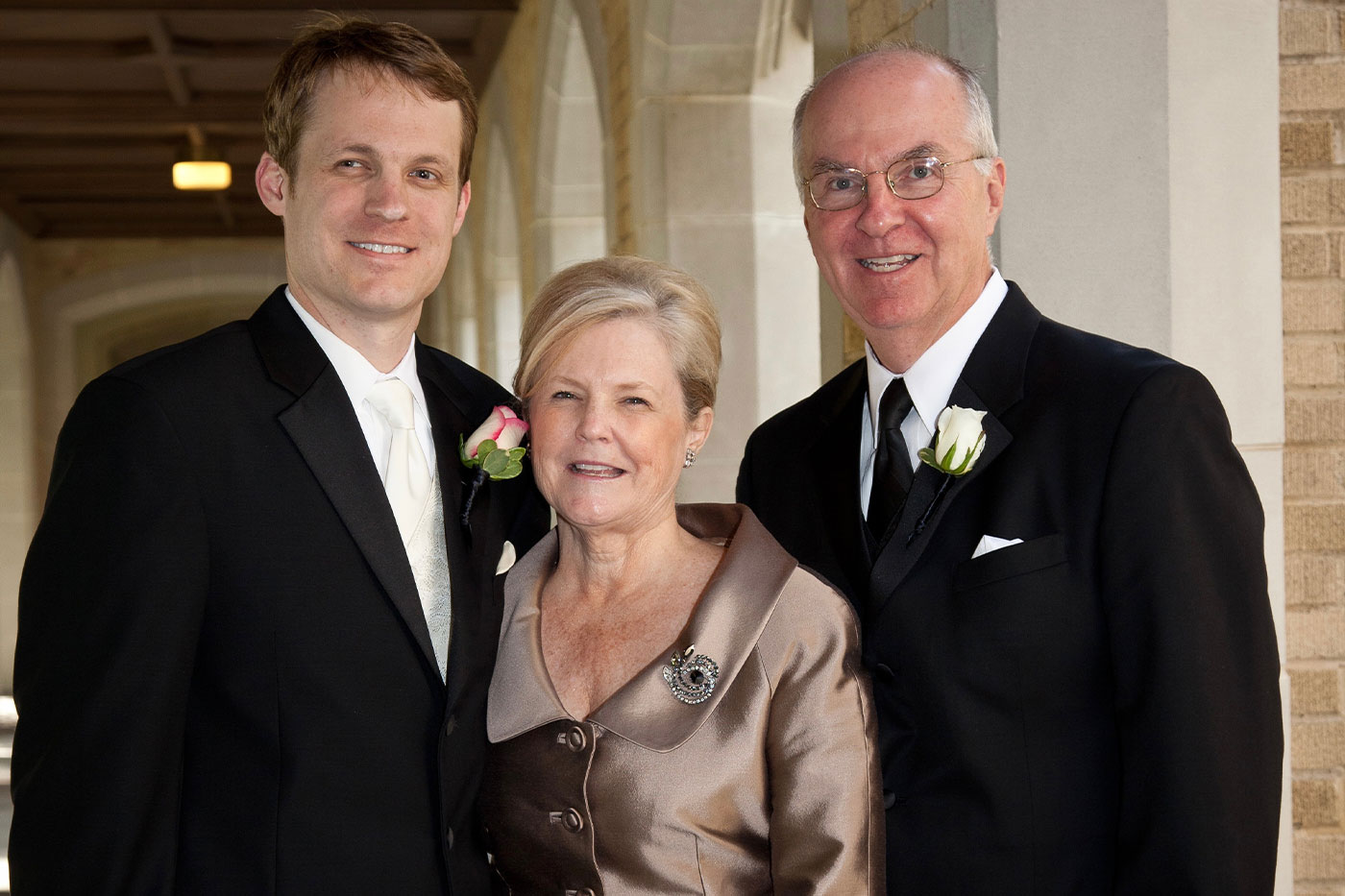
To this day, the deeply religious Doug and Betsy are convinced this was an angel checking in on them and giving them hope at the time they most desperately needed it. Turns out they received regular “God winks” throughout the ordeal that lifted them up and encouraged them at just the right time.
That wasn’t going on everywhere, though. They were becoming less and less comfortable with the physician overseeing John’s case. Doug and Betsy worried that the doctor wasn’t encouraging or engaged enough in the day-to-day details of John’s recovery.
After four or five days and believing it was not a good fit, Doug went to the hospital administrator and laid out his case for a change. His request was granted, and the couple sensed an immediate swinging of the pendulum from deep desperation to hopeful optimism.
“This new doctor comes in, looks at John, said he was on his way and looking good,” Doug recounted. “He said, ‘Give him medicine and do this and that.’ For the first time, I started feeling really good that John was going to get out of this thing.”
Doug had another reason for feeling that way, though. During one of those times when he and his wife were at John’s bedside, Doug had reached out and grabbed John’s hand, encouraging John to squeeze it if he could hear his voice.
John squeezed. Doug thought it might have just been a random reaction, so he asked again, instructing him this time to squeeze twice.
“Bam! Bam,” Doug says, animating his son’s response while removing his glasses and drying his eyes as the memory fully forms in his mind. “Betsy goes crazy. I go crazy, but I wanted to try one more time.”
Now he asked John to squeeze three times if he could hear his father’s voice.
“Wham! Wham! Wham,” Doug says, punctuating each grip. “I told the doctors what was going on, and they were very pleased that he could hear and respond to what was being said.”
John was on the way back, but his real journey was just beginning.
“Surviving meningitis turned out to be the easy part, so easy that I’d done it in my sleep,” John said. “The seemingly impossible part was living after surviving meningitis.”
Starting over with the little things
“I suppressed all of this stuff for a really long time,” John says, reflecting on just how far he’s come in the past 26 years. “The story is good because it’s unique. I go to sleep and wake up eight days later. I am in a bed, can’t see anything, and there are tubes all over my body. And obviously, my story isn’t done.”
The most painful chapter was written years ago. After those weeks at UMC, John faced the stark realization that his life would never be the same. The most lingering mark of the meningitis was on his eyes. His right eye has no vision, and his left eye has something like 20/300 vision.
Because there were additional neurological impacts, John had to re-learn a lot of activities most people take for granted like swallowing and walking. Meningitis also struck his bladder function, leading to a neurogenic bladder and a heaping dose of social anxiety as he adapted to using an intermittent catheter several times throughout each day.
Most of all, though, he had to learn how to move around in a busy world with seriously compromised eyesight.
“The meningitis resulted in some swelling in my brain,” he said. “It resulted in cutting off the blood flow to my optic nerves, the connection between the eyeball and the brain, and I have permanent damage there.”
Still, he was adamant about wanting to finish his sophomore year and go on to earn a business degree from Texas Tech.
Those early days were challenging and difficult, testing John as well as his parents, but he was diligent about therapy and making incremental progress. After leaving UMC, John returned to his home in Plano to begin the next stage of recovery. A month of that familiarity did wonders.
“He was doing well and talking to people,” Doug recalled. “He was still learning to walk again, and he was adjusting to the fact that he is no longer the stud he once was as far as a young man having no health issues.”
Next would come a full-time return to Texas Tech. While convalescing, John remarkably still completed the coursework and assignments during that spring semester. He missed little school, dropping one class that first semester while recovering. Faculty accommodated his needs; family members transcribed his answers and read material to him as did a small number of local junior Honor Society students picking up volunteer hours.
Over the summer he and his parents agreed it would be good to move back to Lubbock. He was welcomed with open arms by the campus community, his fraternity and his roommates.
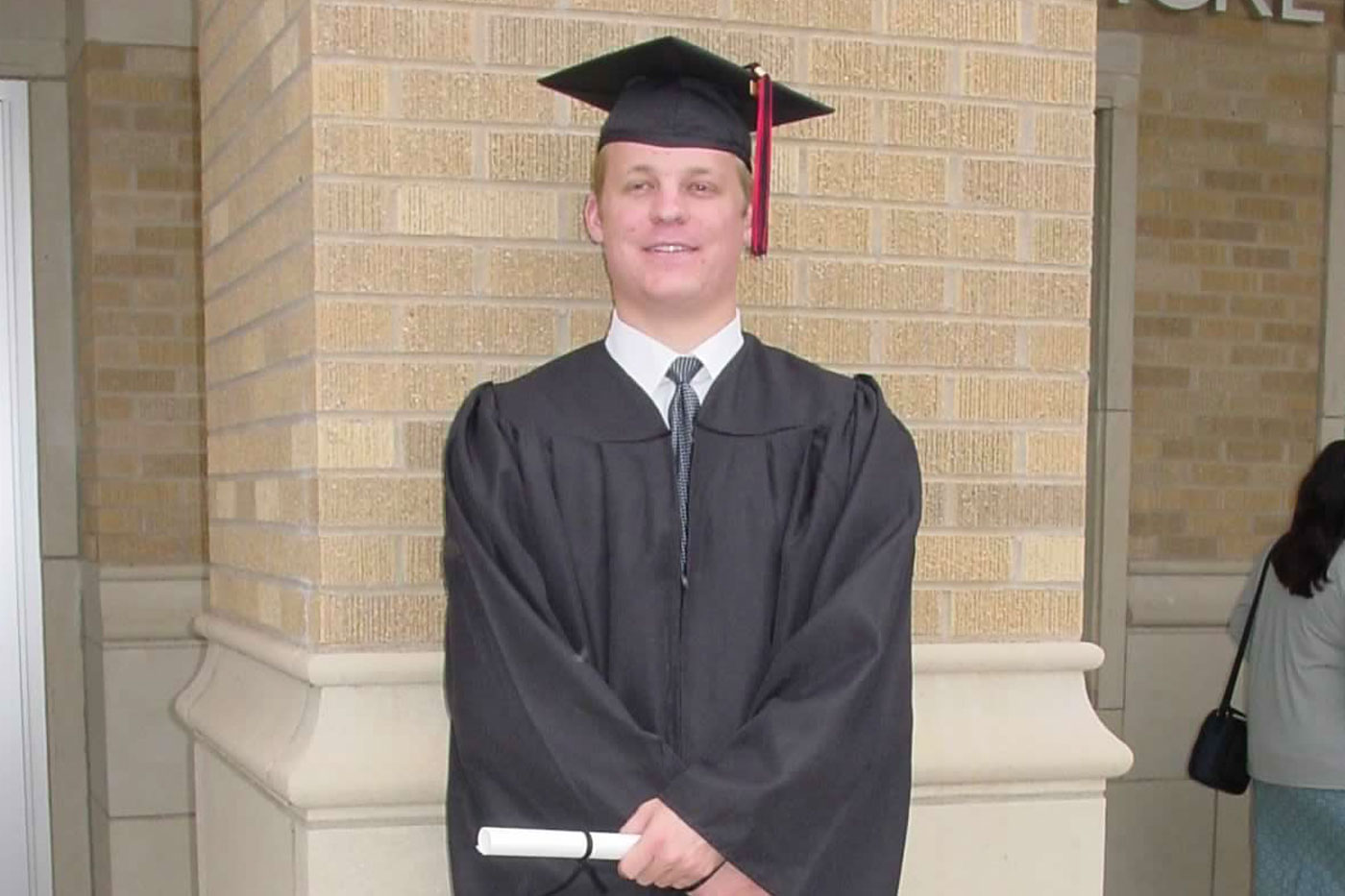
“Everyone just helped him,” Doug said. “There were adjustments. He couldn’t drive and he was having to adjust to basically being blind, but despite all of that, he made it happen and found a way to be the great John Grimes. It was tremendous to see.”
It took John three and a half years to wrap up the work on his degree; he graduated in August of 2001.
John was not going to let the vision challenge define him. He fitted his computer with adaptive software that made it possible for him to use his limited field of vision. After graduation, he decided to work with his father in the insurance industry.
Getting certified to sell insurance can be demanding and requires passing tests and submitting paperwork to testify that professional hurdles have been cleared. For a long time, John had a hard time finding an exam setting that could accommodate his vision challenges.
“Those were the kinds of things that frustrated me,” Betsy remembered. “I was like, ‘C’mon, he wants to work and needs to have this.’ It was my impatience with the system.”
Finding a rewarding career by transitioning into the workforce was only one challenge. There were also social challenges as John was reluctant about dating.
“I think John just didn’t want to burden any female with himself and his disability,” Betsy said. “But we were all thinking pretty small.”
Doug and Betsy socialized with a group of church friends. One friend persistently encouraged them to volunteer once a month at The Bridge, a homeless shelter in downtown Dallas. While Betsy was initially reluctant, she soon changed her mind. Betsy met Kerrie Fielden, a Texas Tech alumna and librarian at the local elementary school, who also volunteered during the same shift at The Bridge.
Following the volunteer work, the group would go out to eat. At one of these gatherings, Betsy shared some of John’s story, including the fact that he was not interested in dating.
After hearing the story, Kerrie told Betsy she knew a third-grade teacher at the elementary school who found it hard to date because she wasn’t interested in going to nightspots to meet people. She asked for John’s phone number and email address and told Betsy she would pass it along.
At first, Betsy decided against sharing John’s contact information, worried that maybe she was stepping too far into her son’s business.
“I thought about it a few weeks and called her back and gave her John’s phone number and email address,” she said. “I told myself John would just have to deal with the consequences.”
There was radio silence from John for weeks until one day out of the blue he told his mom that he was meeting a woman named Erin at a nearby Starbucks and also at a popular Mexican food restaurant from time to time.
“And that’s who he married,” Betsy said. “When my friend the matchmaker told Erin she met this guy at a homeless shelter, she said, ‘I’m not that desperate.’”
That’s right. Erin and John met on a blind date.
Love isn’t always blind
“Kerrie came up to me and said she had someone she could set me up with,” Erin remembers. “She had never met him, but she told me, ‘His mom says he’s great.’”
Erin, who grew up in Silsbee, Texas, and John began their relationship by exchanging emails. That turned into phone calls, and that led to their first date June 16, 2009. They planned to meet at Mi Cocina, a popular Mexican food restaurant with a location at The Shops at Legacy, an upscale retail area in Plano.
First, though, Erin undertook a little social media recon, using friends on Facebook to try and find out more about John, but there was precious little intel available. His profile picture was mysterious as he was wearing a Carrot Top wig and a T-shirt that said, “John Grimes Band,” a fictional musical group from his college days.
“He had told me he was 6-foot-4 with blond hair and blue eyes, but I had no true idea of what he looked like,” Erin said. “I’d been on one blind date before, which caused me to say, ‘Never again.’ But here I am going on another one, nervous as could be.”
John had said he would meet her outside the restaurant, which was typically bustling with activity. Erin was sure she saw John sitting down, although she wasn’t completely certain. Summoning her courage, she walked over to him.
“Hi, are you John?” she asked.
“I am not John,” came the response.
Embarrassed, Erin was about to take off, when the man grabbed her hand.
“He said, ‘I am John Grimes’ so I would know it was him and not some random guy,” Erin said. “We had a wonderful meal, and because we had talked as friends for a couple of weeks, the conversation just flowed. Dinner turned into coffee at Starbucks and then a walk and then a glass of wine.”
It was a three-hour first date, and Erin surmised she had met the right man.
“I knew he had lost most of his vision after getting sick with bacterial meningitis in college,” she said. “But it was never an issue for me. On our third date, he said, ‘You can ask me anything you want. I am happy to answer your questions.’”
John walked her through every excruciating detail of what he had been through to where he was now. As a result of his transparency and vulnerability, Erin became his most ardent admirer.
“He is just the most incredible person I have ever met,” she said. “His blindness has never stopped him from doing anything. Other than driving, there isn’t anything he can’t do. He will find a way, and he just amazes me because the blindness happened to him, but it does not define who he is – not his heart and not his character.”
John and Erin got married at Highland Park United Methodist Church in October 2011. Their courtship was chronicled in a Dallas Morning News article that appeared in the days ahead of their wedding.
“I had been in enough bad relationships that I knew what I was looking for and what I wasn’t looking for,” Erin said. “I had prayed for someone like John to come into my life, and it was pretty early on, like three months in, that I knew I was going to marry him.”
The couple have had three daughters in the years since. They work together raising their kids and enjoying precious family moments. Because faith is important to both, Erin says John was spared death two decades ago because God had a different plan in mind.
“He could have been taken from us very quickly, but God wanted him here,” she said. “It wasn’t his time to go, and he lives life that way. He tells me there is a reason he was saved that day, and he doesn’t take anything for granted. His glass is always half full.”
Betsy knows things have a way of working out, sharing her son’s contact information when she was unsure about it. What if she had withheld those details?

“We have three beautiful granddaughters,” Betsy beams. “What if I had held my ground and not gone to the homeless shelter. If I had done that, I would have never known Erin or this situation. We know John still has parts of his journey to go, and that we can only encourage him along the way.”
Yes, there will be tough moments ahead, but John, more than anyone, knows how far he has come and who has helped him get there.
“Erin not only changed the destiny of my heart, but also of my life,” he says.
Forging on into the future
What’s next isn’t necessarily at the top of John’s to-do list. He is uncertain which path he wants to take professionally these days. He is thinking about accessibility, his knowledge of it and how to leverage his learnings into a career path.
“Possibility is always a possibility,” he says.
Along those lines, in conjunction with World Meningitis Day on Oct. 5, he will host a charity golf event called Shots 4 Meningitis. The benefit tournament is scheduled to begin at 10 a.m. at the Top Golf facility in The Colony, Texas. For more information on the event, visit www.shots4meningitis.com.
Grimes also remains certain about one thing: He is ready to share this story and convinced others will find it inspiring.
And it is undoubtedly heroic stuff. Rare is the person who comes within moments of death on multiple occasions and not only lives to tell about it, but can do so while including the happy details of a great marriage and beautiful children.
For the most part, he has worked through the aftermath of his personal tragedy, choosing not to focus on why this terrible thing happened to him, but instead on what he can do despite its lifelong impact.
He leans into the book of James, a New Testament epistle known for its blunt discourse and insistence on the faithful being patient throughout whatever they might endure.
“You have to have action with faith,” he says. “You can’t have one or the other waiting around and praying for this job or this situation and then waiting for it to happen. You have to be active.”
Even far on the other side of those events from long ago, life is still a challenge. Raising children is difficult. Being married is demanding. Building a career and feeling a sense of accomplishment can take a toll.
Now, long after the Day Everything Changed when meningitis permanently disrupted the architecture of his life, John has put his energy into other pursuits and is driven by a two-word mantra that has become a touchstone: Don’t wait.
After all, now rarely hangs around because brevity is its very nature.
He knows waiting would have meant missing out on so many of the milestones of his incredible comeback story like getting married and having a family. What could have kept him on the sidelines of life instead has fueled his fire and his passion for living.
“We all have our ups and downs, and some of those particular ones happen in college,” he said. “For me, I had something happen to me, and then there was a push and pull of why and how and the need to know that somebody knows what’s happening in my life, and this is not all there is to it.
“There are bigger things ahead. Ultimately, it comes down to faith and having it on the good and bad days because whatever is going on here is always temporary.”
There’s another phrase that regularly pops up in John’s life, and it also informs a lot of who he has become these days: Destiny is debatable. That’s the title of both a podcast he is hosting and a book he is writing where he parses the fine line between whether something is meant to happen or whether it was the confluence of random circumstance that produced an outcome – like a young man left ambiguously blind.
“Where I am now is parts unknown,” John says, almost to himself. “Life is going to be pretty long if you’re going through every day all sorrowful. There is certainly time for that, and I did some of that and still do some of it, but there comes a point where you have to embrace things and go forward.
“Destiny is debatable. The filter through which you view your circumstances is most certainly up to you. Whether you wake up in your own bed tomorrow, in a luxury suite at the Ritz-Carlton or in a hospital, don’t wait to start building your life into the one you want. Waiting is like being at the DMV (Department of Motor Vehicles); your future seems to be in the hands of the apathetic.”
There is another, more direct choice guaranteed to generate a bigger and better payoff.
“Don’t wait,” he says. “Just do the next right thing. Even if you end up taking two steps forward and one step back, that’s still progress. In Texas, we even call it dancing.”

